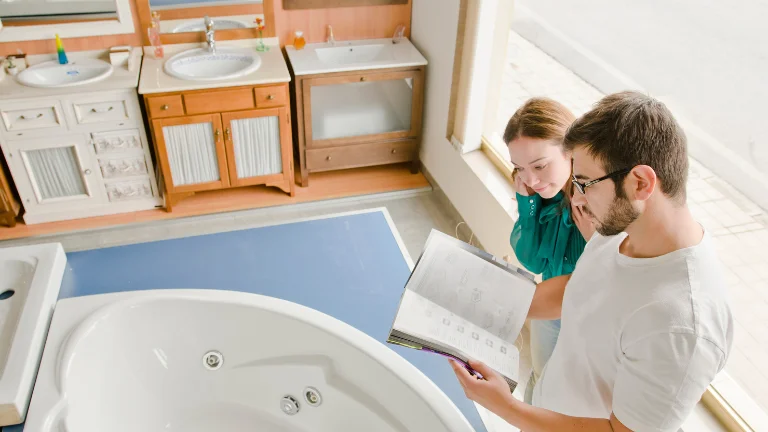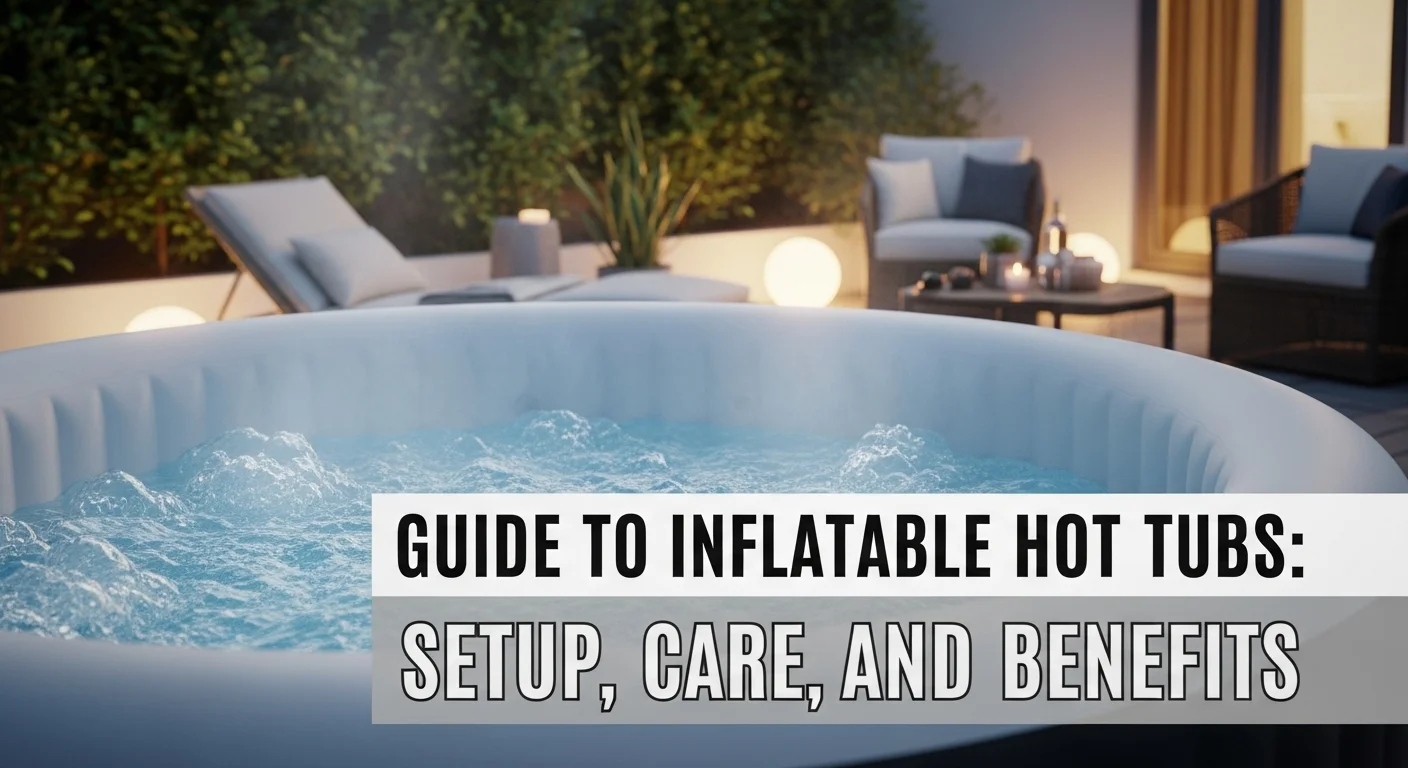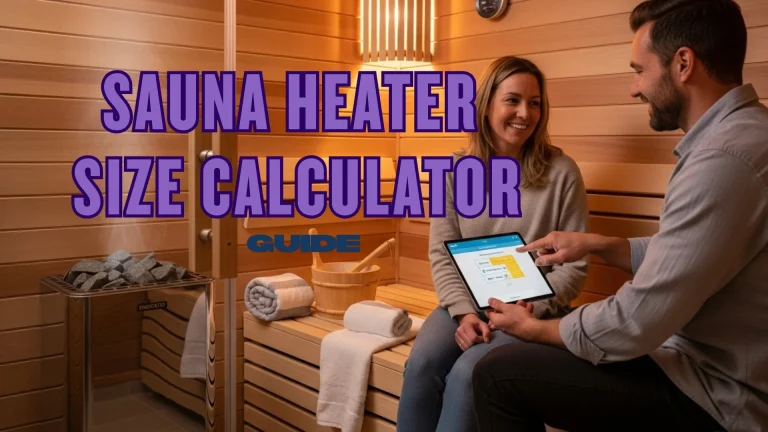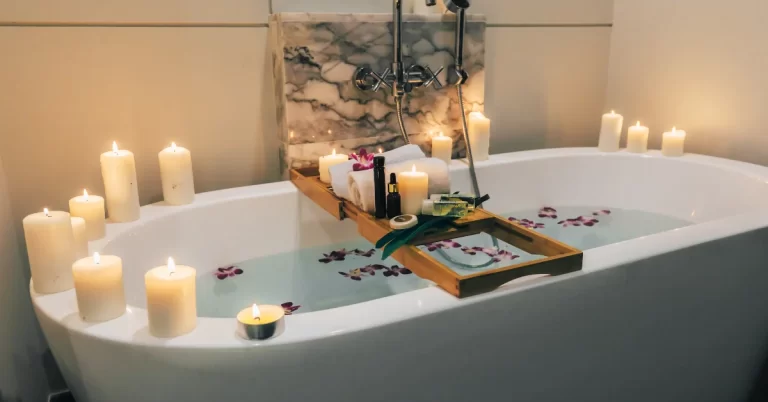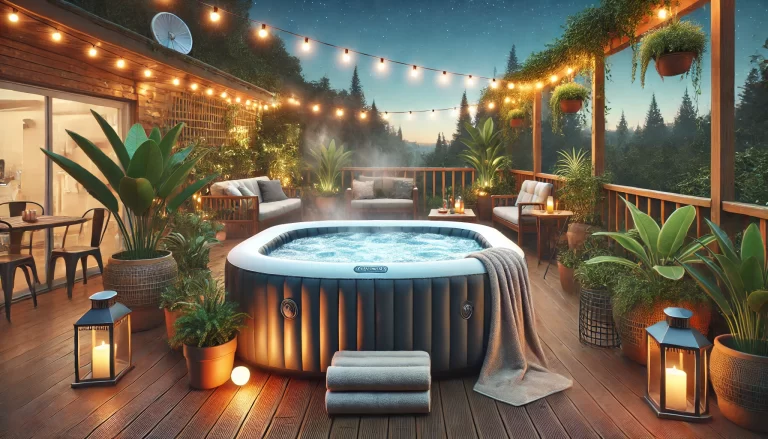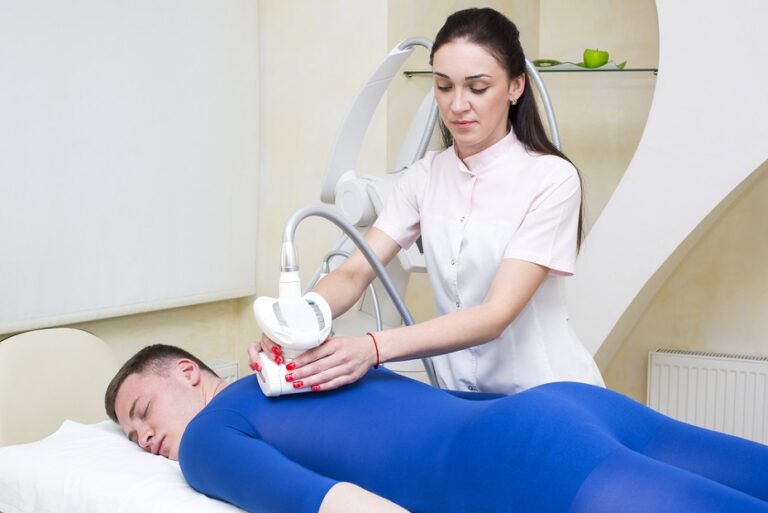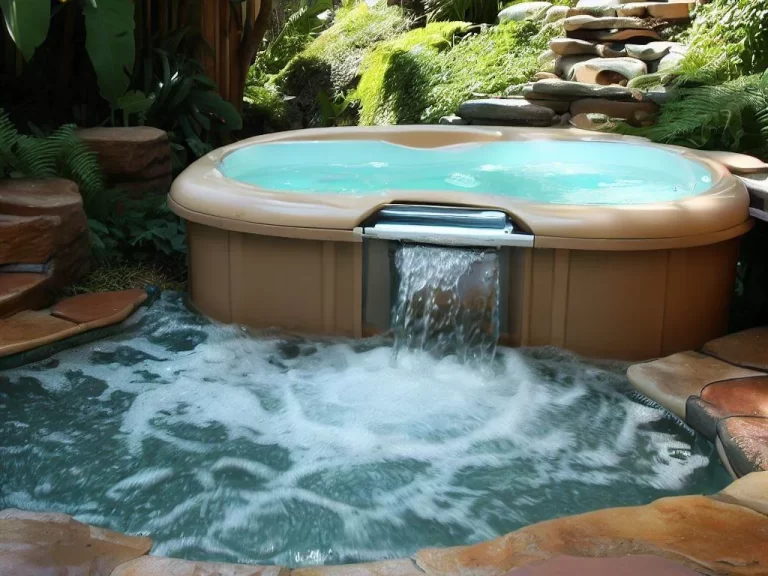Ultimate Guide to Inflatable Hot Tubs: Setup, Care, and Benefits
Inflatable hot tubs are portable spas made from durable vinyl that can be set up almost anywhere with a flat surface. They include a built-in pump for inflation, heating, and water circulation. Many models fit 2 to 6 people, heat up within a few hours, and offer an affordable way to enjoy relaxation at home.
- What is an inflatable hot tub?
- Inflatable Hot Tubs Ideas Backyard
- Inflatable Hot Tubs for Small Backyards
- Inflatable Hot Tubs Benefits
- Inflatable Hot Tubs Maintenance
- Inflatable Hot Tubs Cost Guide
- Inflatable Hot Tubs Safety Tips
- Inflatable Hot Tubs on Decks
- Inflatable Hot Tubs with Adjustable Temperature
- Gazebo Ideas for Inflatable Hot Tubs
- Winterization Tips for Inflatable Hot Tubs
- Party Themes for Inflatable Hot Tubs
- FAQs
What is an inflatable hot tub?
An inflatable hot tub is a portable spa made of durable vinyl that inflates with a pump and fills with water. It sets up on patios, decks, or backyards in just a few hours. Most hold 2–6 people, use about 150–250 gallons of water, and plug into a standard outlet.
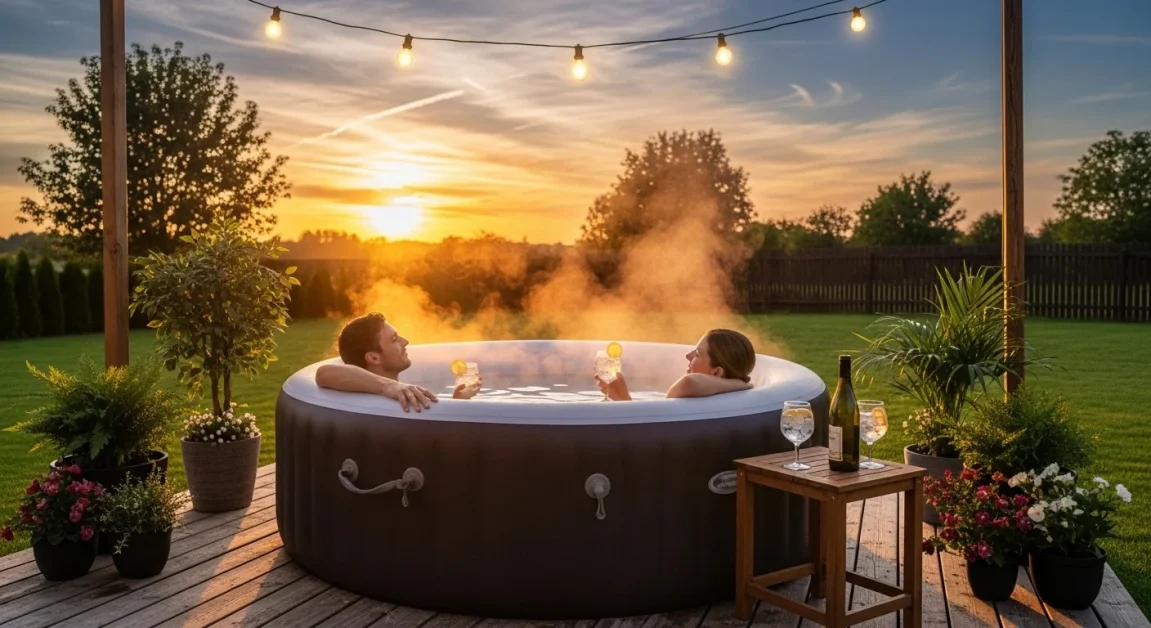
How inflatable hot tubs work compared to traditional spas
Both heat and circulate water, but inflatables use air jets for gentle bubbles while traditional spas use water jets for stronger massage. Inflatables plug into 110V outlets and are easy to move, while permanent tubs need 220V wiring and professional installation.
| Feature | Inflatable | Traditional |
|---|---|---|
| Setup | 2–4 hours | Days with install |
| Power | 110V outlet | 220V line |
| Jets | Air bubbles | Water massage |
| Mobility | Portable | Fixed |
| Lifespan | 3–5 years | 10–20 years |
Average cost of inflatable hot tubs
Most inflatable hot tubs cost between 300 and 800 dollars, while permanent models often start at 3,000. Monthly operating costs are usually 20–40 dollars for power and chemicals. Replacement filters run about 10–20 dollars.
Are inflatable hot tubs worth it?
If you want an affordable, portable way to relax, they are worth it. They give you warm soaks without a big commitment or expense. For powerful hydrotherapy and long-term durability, a permanent spa is the better choice.
Inflatable Hot Tubs Ideas Backyard
Landscaping ideas around inflatable hot tubs
Even a small yard can feel like a retreat with the right landscaping. Use potted plants, garden beds, or tall grasses to frame your hot tub. Adding stones or wooden decking around the base can make it feel more permanent without the cost of a built-in spa.
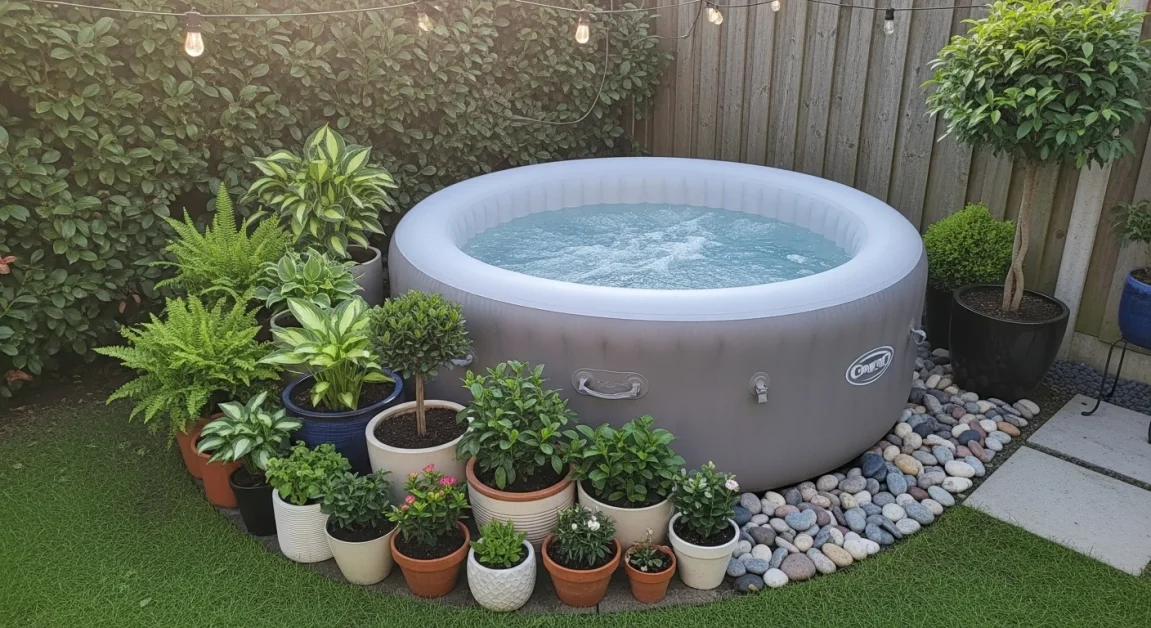
Affordable backyard spa design tips
You don’t need a big budget to create a spa-like vibe. String lights, outdoor rugs, and a few comfy chairs can set the mood. Look for secondhand patio furniture or DIY wood pallets to build budget seating and storage.
Adding privacy and shade to your hot tub space
Privacy is key for relaxation. Use lattice panels, outdoor curtains, or tall planters to create a secluded space. A pergola or shade sail not only adds cover but also keeps water temperature steady on sunny days.
Cozy backyard setups for inflatable hot tubs
For a warm, inviting setup, focus on soft lighting and layered textures. Lanterns, fairy lights, and cushioned seating make the area feel more intimate. Adding a small fire pit or side table for drinks can turn a simple hot tub soak into a nightly ritual.
Inflatable Hot Tubs for Small Backyards
Adding a compact hot tub to a small backyard doesn’t just save space, it can also make the area feel more inviting and purposeful.
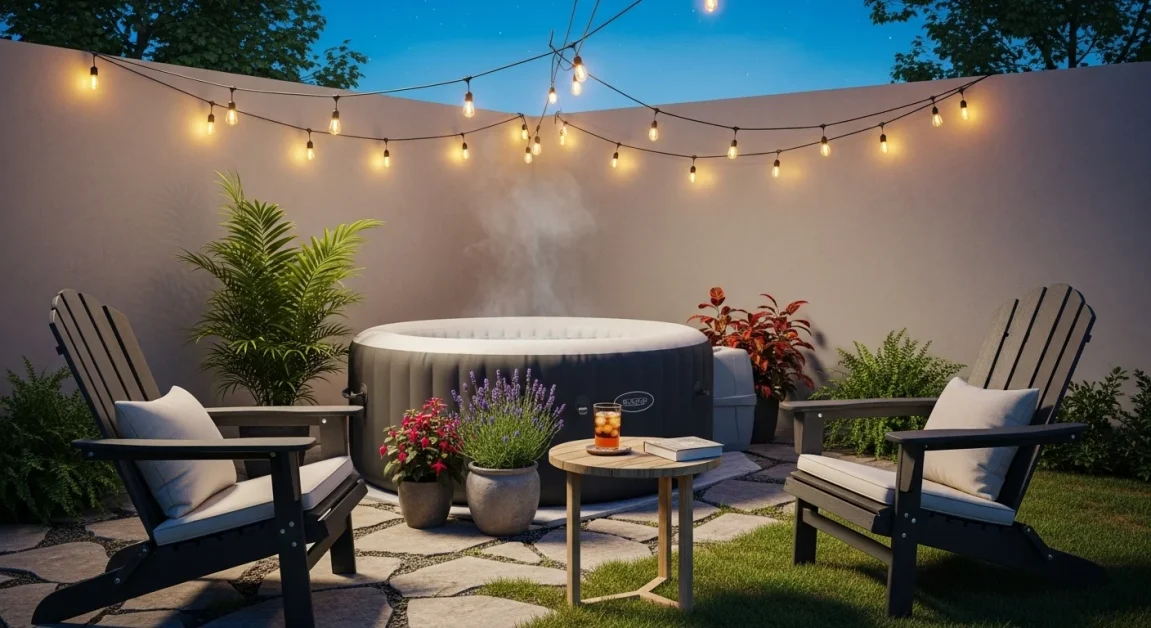
Best inflatable hot tubs for tight spaces
If your backyard is limited, look for round or square models under 77 inches wide. Brands like Intex and Coleman offer compact designs that still seat 2–4 people comfortably. Features like built-in seats, insulated covers, and simple plug-and-play setups make them perfect for small yards without sacrificing relaxation.
Placement tips for a small backyard spa setup
Where you put your hot tub makes a big difference. Keep these in mind:
- Choose a flat, sturdy surface like a concrete slab or reinforced deck.
- Leave at least 2 feet of clearance on each side for access and maintenance.
- Place it near an outdoor outlet but away from low-hanging trees or debris.
- Add privacy screens, planters, or lattice walls to create a cozy spa nook.
Compact inflatable hot tubs for 2 people
Two-person inflatable spas are ideal for couples or solo relaxation. They’re lightweight, easy to move, and use less water (about 150 gallons) and power than larger models. Many heat up within 12–24 hours and maintain a steady 100–104°F temperature. Plus, their smaller footprint leaves room for seating or a grill nearby.
How to make a small yard look bigger with a hot tub
Smart design tricks can help your yard feel more spacious:
- Use neutral colors for decking or tiles to create a seamless flow.
- Add mirrors, string lights, or vertical planters to draw the eye upward.
- Keep furniture minimal and multi-purpose, like benches with storage.
- Position the hot tub in a corner to open up the central space.
Inflatable Hot Tubs Benefits
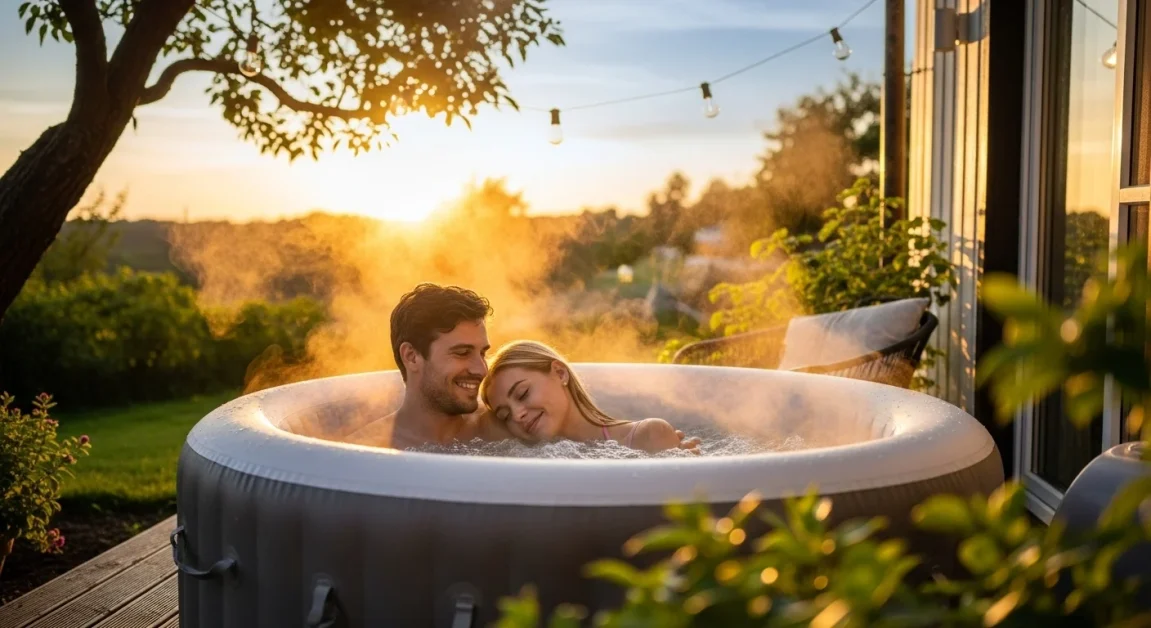
Health and relaxation perks
Hot tubs are known for soothing sore muscles, easing stress, and improving circulation. The warm water and air jets provide gentle hydrotherapy, making them great for recovery after workouts or just winding down.
Budget-friendly compared to permanent spas
Inflatable models cost between $300 and $1,000, while traditional hot tubs often run $5,000 or more. They also use less power, which can cut down monthly energy bills.
Quick setup and portability
Most inflatable hot tubs inflate in 10–15 minutes and plug into a standard outlet. You can drain and move them easily if you change your backyard layout or move homes.
Inflatable Hot Tubs Maintenance
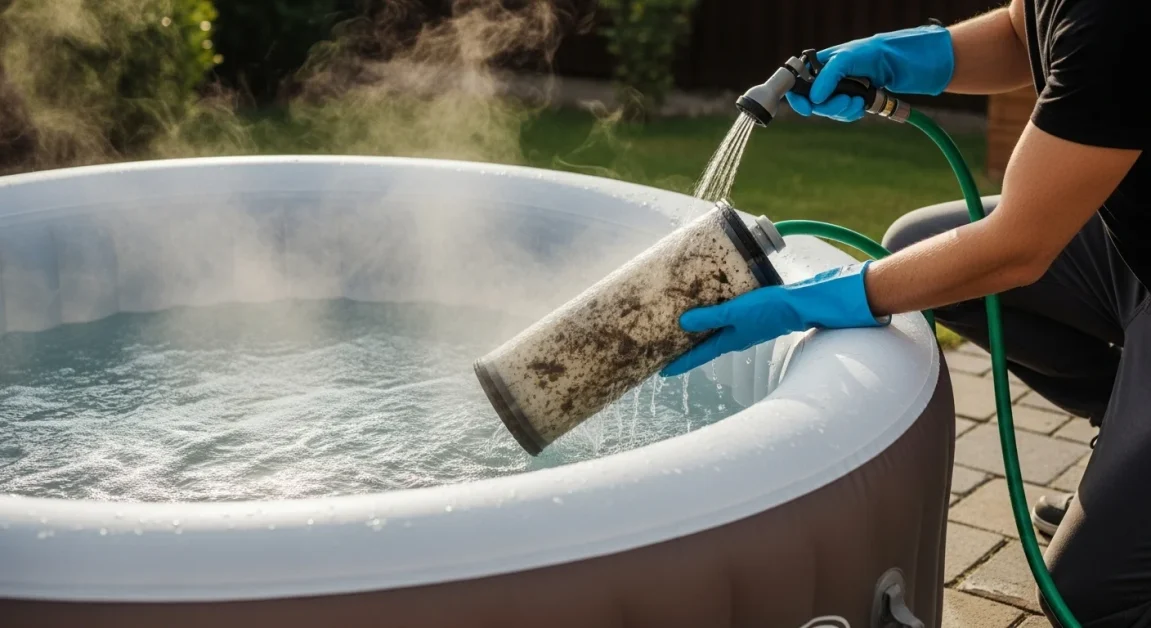
Cleaning basics
Drain and refill the water every 4–6 weeks. Use a spa vacuum or skimmer net to clear out leaves and debris.
Water treatment and chemicals
Test water weekly with strips and balance pH between 7.2 and 7.8. Add chlorine or bromine tablets to keep bacteria away.
Filter care
Rinse filters every week and replace them every 1–2 months, depending on usage. Clean filters are key to clear water and smooth pump operation.
Inflatable Hot Tubs Cost Guide
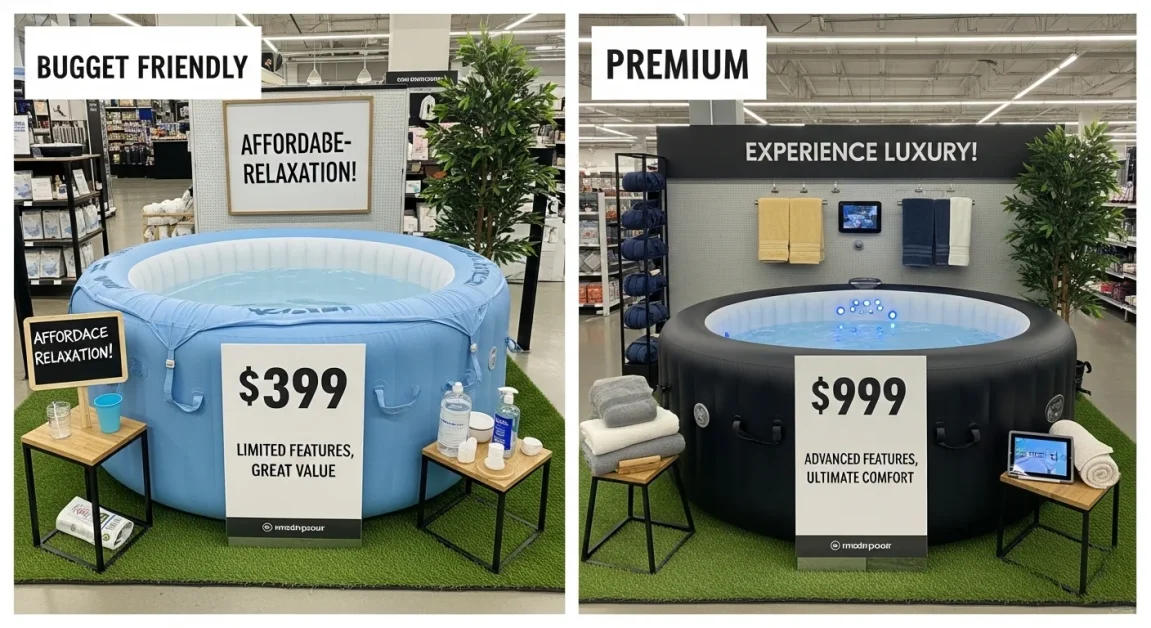
Purchase price ranges
Entry-level models start at about $300, while larger or premium models with extra jets can reach $1,200.
Running costs
Expect to spend $20–$40 per month on electricity if you use it regularly, plus about $15–$25 for chemicals.
Longevity and value
With proper care, most inflatable hot tubs last 3–5 years. Spending a little more upfront on a durable brand often pays off long term.
Inflatable Hot Tubs Safety Tips
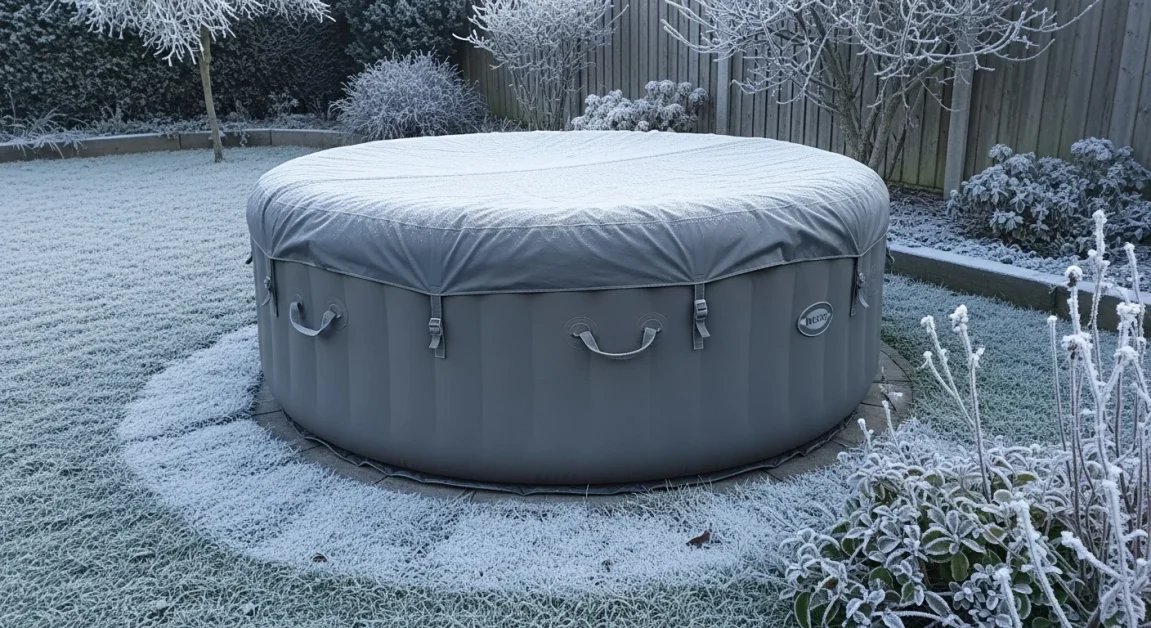
Safe setup and use
Always place your hot tub on a flat surface and keep electrical cords away from water. Don’t let children use it unsupervised.
Temperature control
Keep water between 100°F and 104°F. Anything hotter can be risky, especially for kids or people with health conditions.
Seasonal care
In colder climates, use insulated covers and consider moving the tub indoors to prevent freezing damage.
Inflatable Hot Tubs on Decks
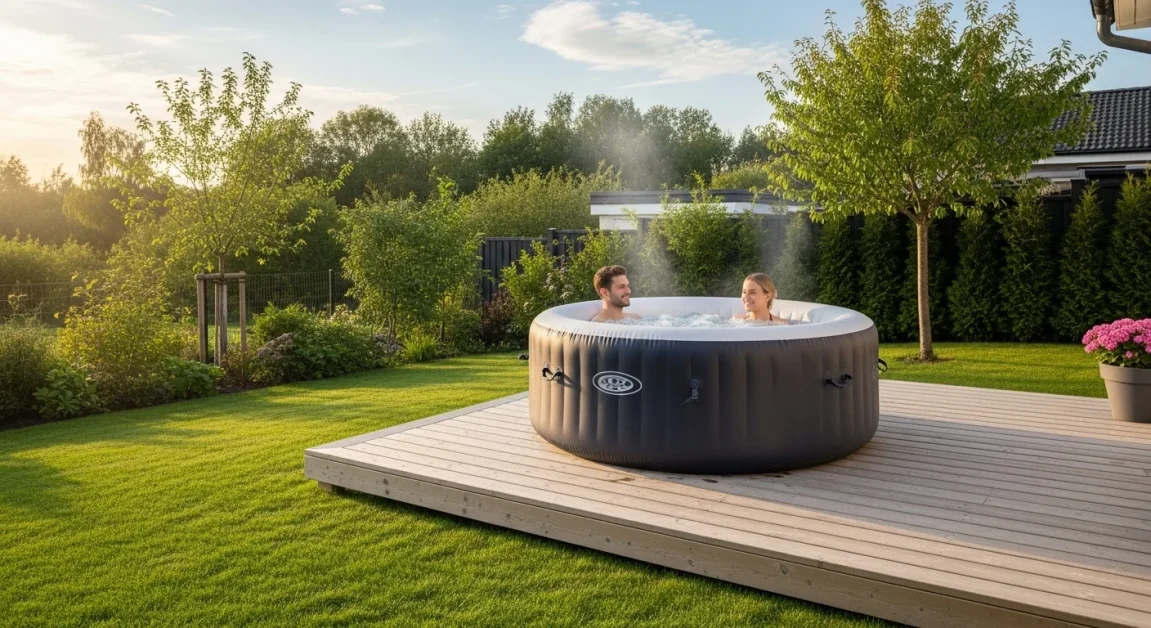
Can you put an inflatable hot tub on a wooden deck?
Yes, but only if the deck is strong enough to handle the added weight. A filled inflatable hot tub can weigh over 2,000 pounds, so not every wooden deck is suitable. Always check the deck’s structural integrity before setting up.
Weight limits and safety tips for decks
Most standard decks are built to hold about 40 to 60 pounds per square foot. A hot tub often exceeds that, so safety checks are a must. Distribute weight evenly, avoid placing the tub too close to railings, and inspect for signs of wear like sagging or rot.
Reinforcing a deck for a hot tub setup
If your deck isn’t built for heavy loads, reinforcement may be needed. This can include adding extra joists, stronger beams, or concrete footings underneath. A contractor can assess the structure and recommend improvements to make it safe for a hot tub.
Waterproof mats and flooring solutions
Protecting your deck from water damage is just as important as weight support. Use waterproof mats, interlocking tiles, or rubber flooring under the tub. These prevent slipping and extend the life of your deck by stopping water from seeping into the wood.
Inflatable Hot Tubs with Adjustable Temperature
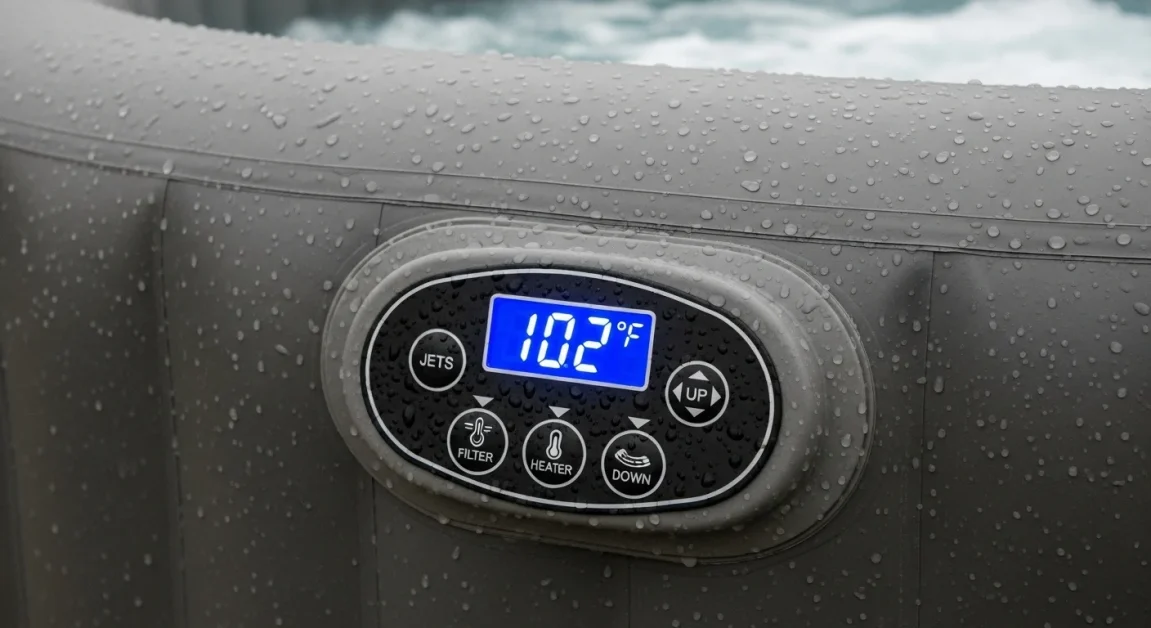
Temperature range of inflatable hot tubs
Most inflatable hot tubs heat up to 104°F, which is the safe maximum set by health standards. Some models allow lower settings for casual soaking, usually between 80°F and 100°F. This flexibility makes them usable year-round.
Energy-efficient heating tips for hot tubs
Keeping heat costs down is possible with a few smart tricks:
- Use an insulated cover when the tub isn’t in use
- Place the hot tub in a sheltered area to block wind
- Heat the water during off-peak electricity hours
- Keep filters clean for better circulation
Cooling down your inflatable spa in summer
Hot tubs don’t have built-in chillers, but you can still enjoy a cool soak. Lower the temperature setting to around 80°F, add ice packs for a quick cooldown, or use the tub without the heater on hot days.
Fast-heating inflatable hot tub models
Some newer inflatable spas feature rapid heating systems that raise water temperature by 3 to 4 degrees per hour. Brands with stronger pumps and insulated walls tend to heat faster and hold warmth longer.
Gazebo Ideas for Inflatable Hot Tubs
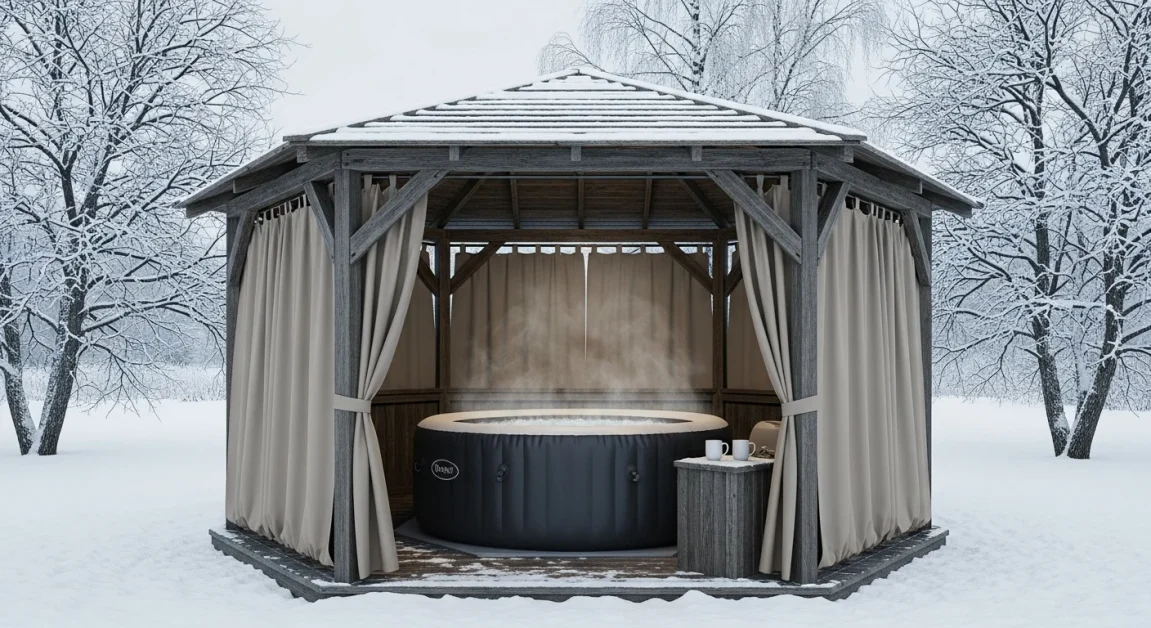
Best gazebos for year-round hot tub use
Permanent gazebos made of metal or heavy-duty wood work well for all seasons. They provide solid overhead coverage, protect the spa from snow and rain, and create a private retreat you can use any month of the year.
DIY gazebo ideas for small yards
If space is tight, try lightweight pop-up gazebos or pergolas built with pressure-treated wood. Simple corner posts with a slatted roof or a retractable fabric top can give shade and shelter without overwhelming the yard.
Budget-friendly canopy and pergola options
Not every setup needs a big investment. Portable canopies, shade sails, and open pergolas provide decent coverage at a fraction of the price. These options are easy to set up and take down as needed.
Weatherproof gazebos for inflatable spas
For heavy rain or strong sun, weatherproof gazebos with UV-resistant fabric and waterproof roofing are worth the extra cost. Look for models with zippered panels or roll-down shades for flexible protection.
Winterization Tips for Inflatable Hot Tubs
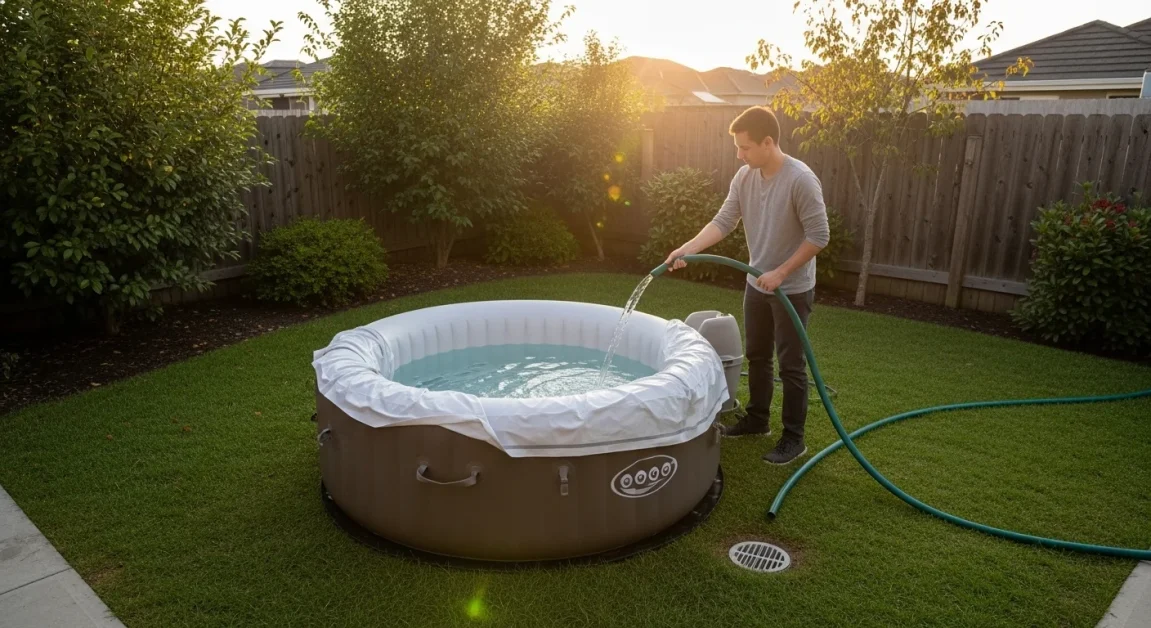
How to drain and store your hot tub for winter
Before freezing temps hit, fully drain your spa, wipe it dry, and let the liner air out to avoid mold. Fold it carefully and store it indoors in a dry place, like a basement or garage. Keep all hoses and pumps together so setup is easier next season.
Protecting your spa from freeze damage
If water is left inside, it can expand and crack the liner or pump. Always check for trapped water in pipes and fittings. Some owners use non-toxic antifreeze in hoses for extra protection, but storage indoors is the safest bet.
Best insulated covers for inflatable hot tubs
A good cover keeps heat in and snow or debris out. Look for thick, insulated covers with locking straps to prevent wind lift. Thermal blankets that float on the water surface add an extra layer of protection.
Can you use inflatable hot tubs in winter?
Most inflatable models are built for mild to moderate weather, not subzero temperatures. Some can handle down to 40°F if they’re heated continuously, but running costs will rise. For cold climates, a permanent spa may be the better choice.
Party Themes for Inflatable Hot Tubs

Fun hot tub party ideas for adults
Bring out floating drink holders, colorful LED lights, and upbeat playlists for a relaxed vibe. Games like waterproof cards or trivia apps on a tablet can keep everyone entertained while soaking.
Romantic hot tub party themes for couples
Set the mood with rose petals, candles around the tub, and soft background music. Add a bottle of chilled champagne or sparkling cider for a cozy, intimate evening.
Music, lights, and decorations for spa parties
Bluetooth speakers, floating lanterns, and string lights around the backyard can instantly turn your hot tub into a mini party lounge. Glow sticks in the water make it playful and Instagram-worthy.
Hot tub safety tips for hosting guests
Keep the water balanced and clean before the party, remind guests to stay hydrated, and limit time in the hot tub to avoid overheating. Make sure the area around the tub isn’t slippery.

